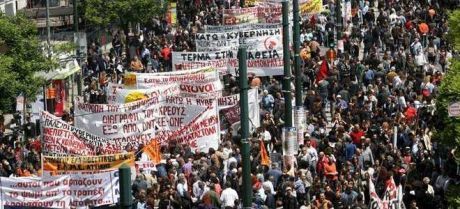Shared
You are here
Greece resists - another government falls but will Syriza break with austerity?

January 18, 2015
A police attack on a group of workers gave an indication of what Greece’s election campaign will be like. Striking migrant workers were occupying a recycling plant near Athens. They hadn’t been paid, so shut the place down and went into occupation just before Christmas.
Cops accused pickets of being violent and arrested 33 people.They included Petros Constantinou, an Athens councillor from the anti-capitalist left coalition Antarsya, and Javied Aslam, head of the Immigrant Workers Union. The same workers had celebrated the collapse of the coalition government led by Tory Antonis Samaras outside parliament in Athens. Ministry of finance cleaners, ERT media workers and school workers all rallied together with them. They’ve been fighting to get their jobs back after being sacked by Samaras. They cheered when they heard the government had failed to win the majority it needed to elect a new president and stay in office. People hugged as they marched around the square. This has been the mood all over Greece.
Radical left party Syriza is likely to win the general election on 25 January. It wants to renegotiate the debt that Greece was plunged into by the bankers’ crisis. The government has gone on the attack with a scare campaign, backed by the media. It has tried to paint a Syriza victory as economic catastrophe.
Debt
It claims that if Syriza wins Greece will default on its debt—run up by the bankers and now held mostly by the European Central Bank (ECB). It hopes to scare moderate voters away from voting for Syriza—but the big swing to the left means the plan is unlikely to succeed. And the campaign failed to convince even conservative MPs to back the government.
Yet the scare campaign isn’t the only obstacle facing ordinary people. The International Monetary Fund (IMF) and private speculators are trying to blackmail Greece. The Capital Group investment fund met Syriza in the City of London and threatened to pull out of Eurobank, one of Greece’s four big banks.
There has also been a very serious development in the run-up to the vote. An MP from the right wing Independent Greeks party alleged that there had been an attempt to bribe him to vote with the government. The courts refused to take his evidence seriously and investigate it. This shows some of the obstacles a left government could face from the state.
Syriza leader Alexis Tsipras called for other left parties to support it, including Antarsya. The government said this willingness to work with people who want to break with the European Union (EU) shows Syriza is extreme.This is all part of the scare campaign.
Of course, we in Antarsya stand with Syriza against government attacks on workers. But there are important differences. Syriza doesn’t want to leave the EU, and it wants to renegotiate the debt rather than cancel it. It is calling for the EU and ECB to respect the people’s democratic will.
In effect, this means to keep funding Greek banks even if Syriza demands a renegotiation of the national debt. But these institutions have shown contempt for democracy many times. The likes of ECB chief Mario Draghi and European Commission president Jean-Claude Juncker won’t suddenly agree to keep funding Greek banks. We have to confront them. The signs are that Syriza’s approach will be appeasement. The anti-capitalist left has to organise pressure from the left and below.
The Syriza leadership has a real problem in planning its campaign. It wanted to support candidates with openings to the right, such as members of the Democratic Left party which until 2013 was part of the government. But inside Syriza there are many who object to this. For some time Syriza has been moving to the right, but it’s difficult to do that during the election.
Compromise
Tsipras knows he can’t win by talking about how to compromise with the bankers. So it has become about balancing between appeasing the bankers while appealing to voters.
People anticipate that a Syriza government will bring real gains for them—and not just economically. The people who were outside parliament expect to get their jobs back, and that will be the first confrontation with a new government. The courts still haven’t set a date for the trial of the Nazi Golden Dawn and a Syriza government would have to deal with this too. Anti-racists have been campaigning to overturn Samaras’ attacks on immigrants’ children, demanding that anyone schooled in Greece should get the right to citizenship. All this is why Syriza has the lead, and what shapes people’s expectation of it will do after the election.
Antarsya’s campaign is helping to keep up the swing to the left. We are proposing candidates who are workers fighting back. Our candidates will be the anti-racists, pinning the blame for racist attacks on the Tories’ racist policies. We will be the ones campaigning for the trial of Golden Dawn. And on the question of the debt, we will argue that we shouldn’t be blackmailed by the ECB. We should break with them, and cancel the debt.
In this way we are countering the scare campaign by the government. And at the same time this election campaign lays the ground for what happens afterwards. We’ll have to keep campaigning even if we do get a Syriza government. We must make sure that what we are fighting for actually materialises.
Panos is a leading member of Socialist Workers Party (Greece). This is republished from Socialist Worker (UK)
If you're in Toronto, join the discussion January 24 "Greece: elections and the fight agianst austerity."
Section:










